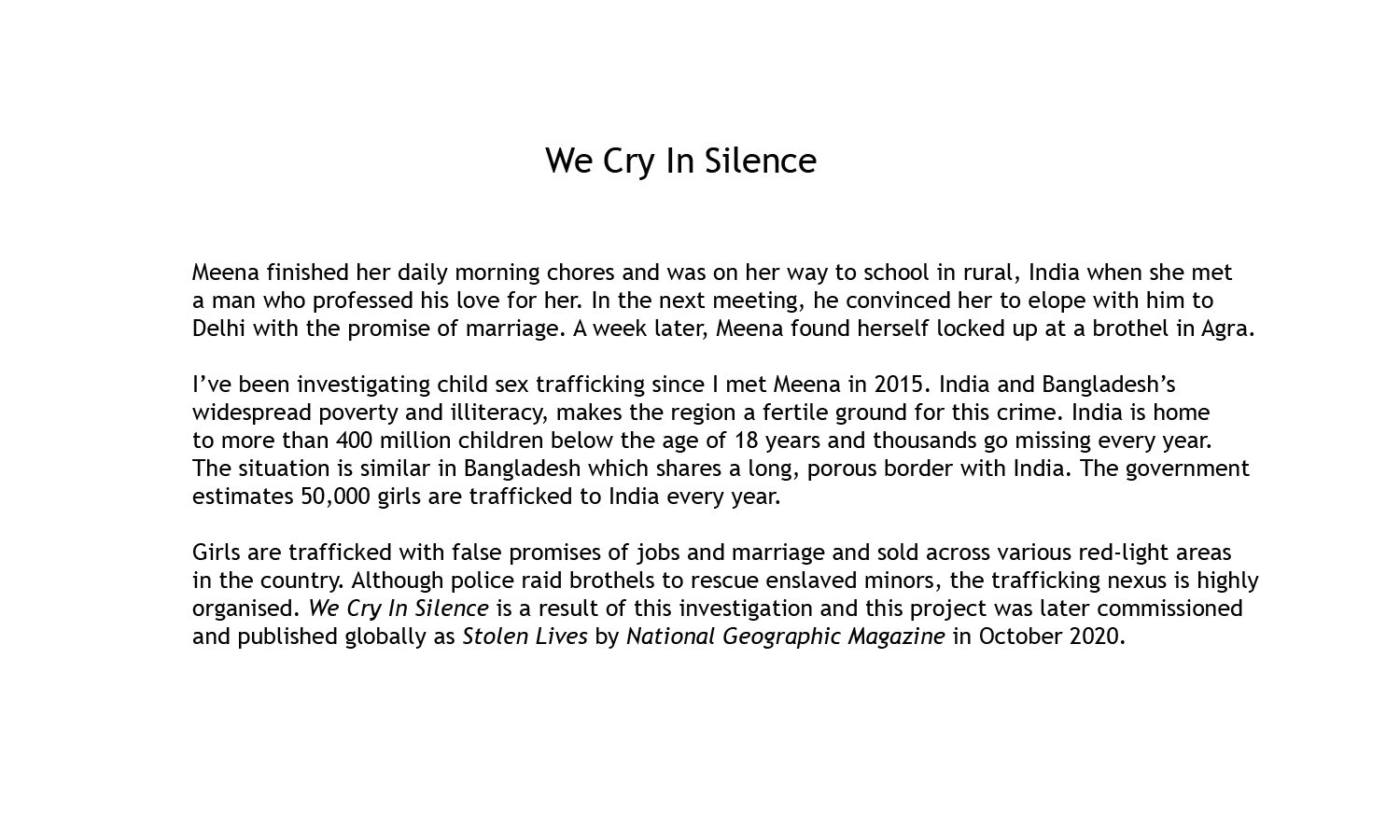

Rekha and Deepa study at a government run school in Torpa, Jharkhand. This region is extremely poor with social problems like domestic servitude trafficking, child marriage and witch hunting.Girls are sometimes tricked by traffickers while on their daily commute to school. These source traffickers are from the communities itself who introduce themselves as employees of placement agencies with the promise of a job and better life in the bigger cities of India.

Girls on their way back home from school at Torpa, Jharkhand, India. This tribal region of Jharkhand is affected by social problems like trafficking, child marriage and witch hunting. The government of Jharkhand has given bicycles to girls across the state to encourage them not to drop out of schools. Many girls in India are still missing out on education because of factors such as accessibility to school, quality of education and unsanitary conditions.

K was trafficked by a woman from her neighborhood and taken to Delhi where she was sold for $800 to a placement agency. The placement agency put her at a private residence to work as a maid, where she was not paid any salary and was often verbally abused. She was later rescued by the police and returned to her home in Jharkhand. K currently lives in a government hostel and is continuing with her studies.

A., who is now 19, eloped with a man several years ago. After she overheard him making plans to sell her to a brothel in Kolkata, she managed to escape. She was found at the railway station in Canning, West Bengal, India by representatives of Childline, an organization that helps children in distress. She was then taken to a shelter where she was counselled by mental health experts. A few months later she was reunited with her family.

Anjali was 16 when she became involved with a man who enticed her to run away from her home in Siliguri, a city in India’s West Bengal state, with the promise of marriage. Instead, he and an accomplice sold her to a brothel in Mahishadal, near Haldia, an industrial town in West Bengal. She was forced to have sex up to 20 times a day until she was rescued. For a year and a half, she lived at a shelter among girls she said understood her anguish. Now an adult, she’s living at home with her mother, who would like her to marry, but Anjali vows not to fall in love again. “I feel extremely lonely,” she said. “I miss my friends at the shelter.”
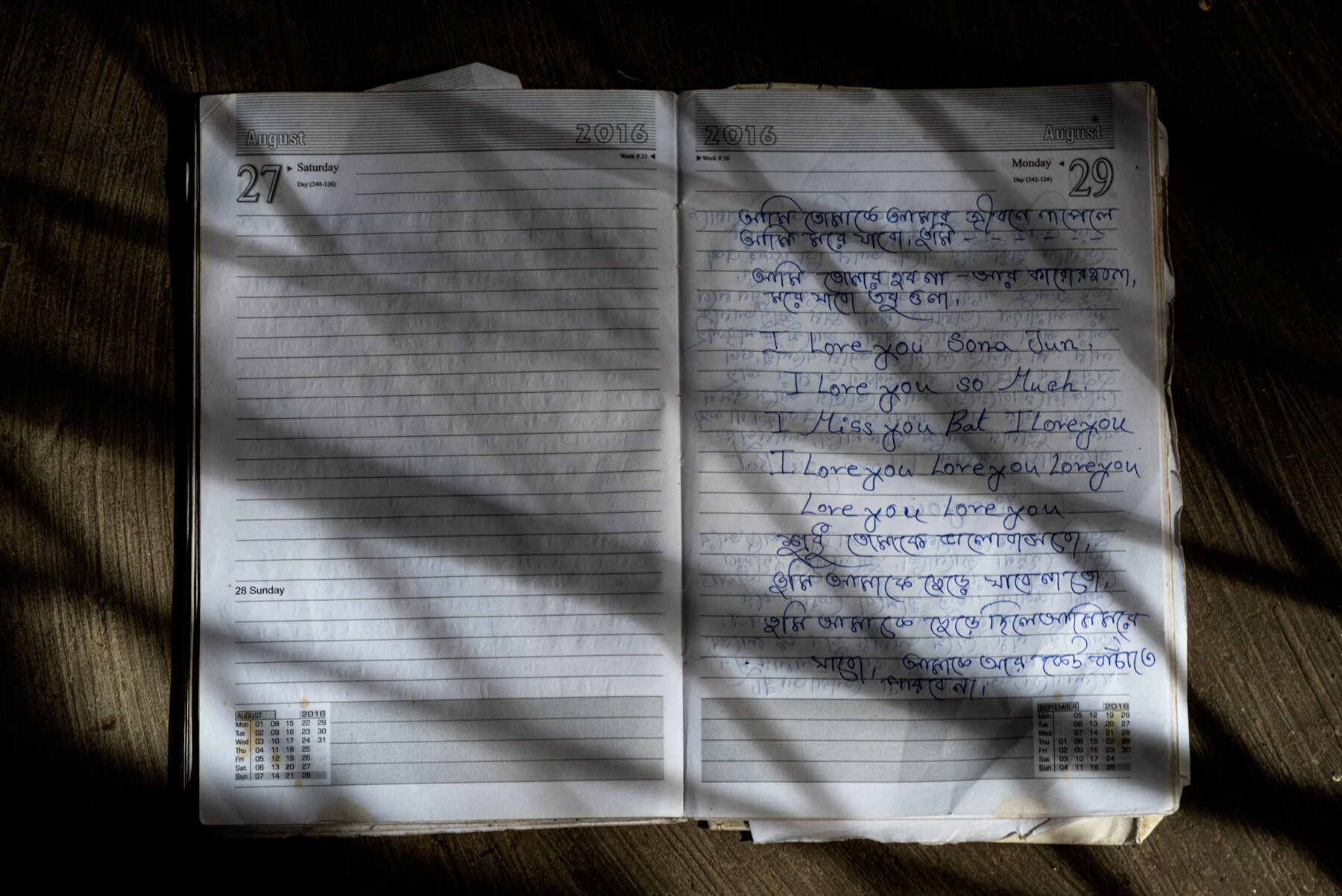
C.’s diary offers a glimpse into the teenager’s infatuation, which the man who trafficked her exploited. Her words in Bengali say: “If I don’t get you in my life, I will die. If I am not yours, I can’t be anyone else’s.”C., was trafficked as a teenager from South 24 Parganas, West Bengal, India. From passages in her diary, the family realized she’d eloped with a man she’d met. Months later, police found her in a brothel in Pune, a city in the western region of India. "I never thought I would be able to get out of that place," C. said. After going through the traumatic experience of sexual slavery, most girls find it difficult to adapt the life they once had. Girls during this transition period experience high rates of depression, anxiety, PTSD, self-harm, and even suicidal tendencies.
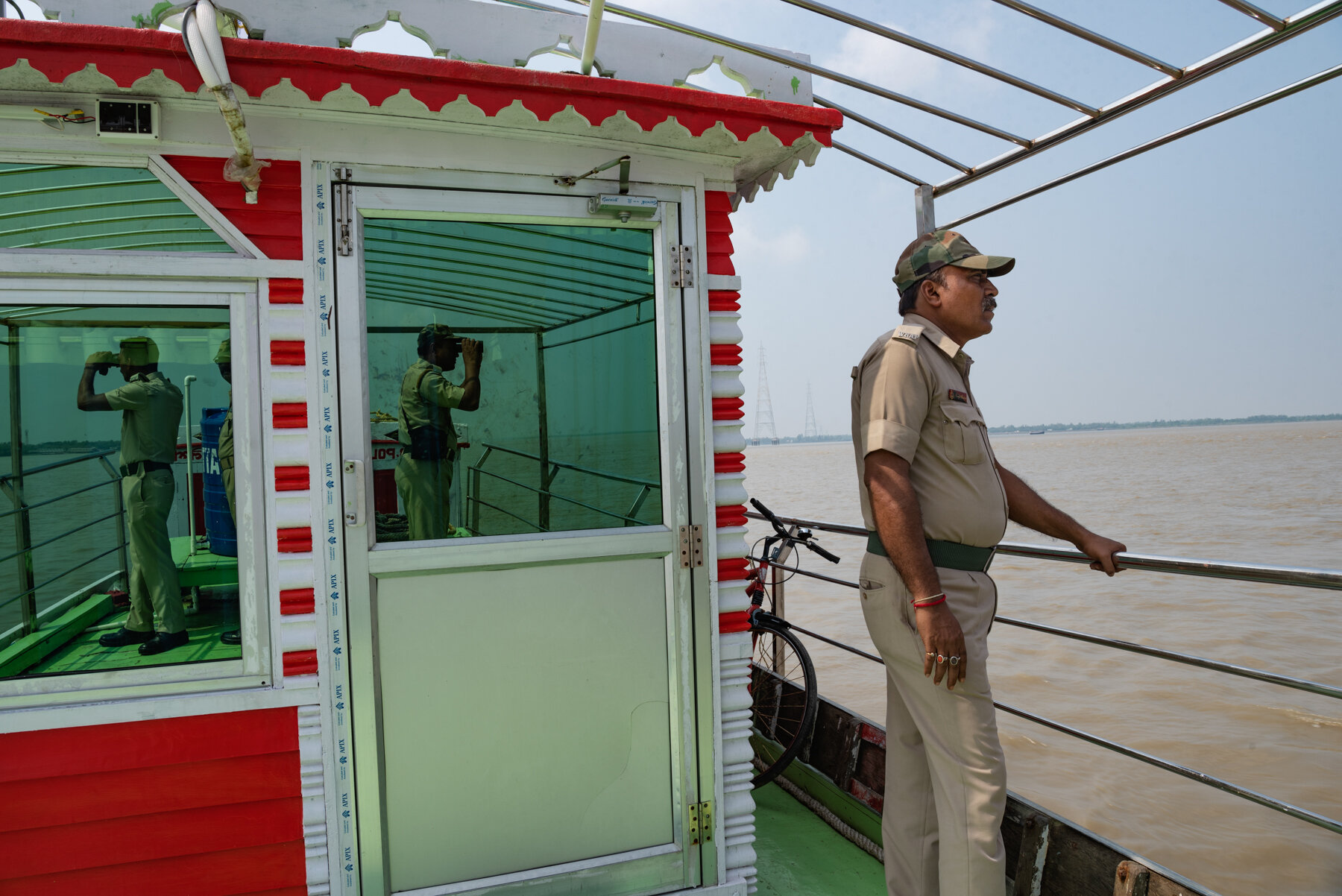
A West Bengal police boat patrols the Hooghly River in the Sundarbans, a watery area with dense mangrove forests that straddles the southern India-Bangladesh border. The Indian state of West Bengal shares a long border with Bangladesh which includes many unguarded stretches, allowing traffickers to smuggle girls into the country. Traffickers often use rivers to avoid detection when smuggling girls into India.

Railway Protection Force official, S.P. Kiro keeps vigilance at the Ranchi Railway Station. Close observation of the general body language of potential suspects through these video cameras has helped the police nab many traffickers who use this major railway junction to transfer girls from the rural areas to other larger cities of India.

Farak Ali Gayen, a trafficker at the Mathurapur Police Station in South 24 Parganas, West Bengal. Farrak was arrested in July 2017 based on a description a trafficking survivor Mala gave of a young man she said trafficked her. He stands between Jagdeep Singh Rawat, an anti-trafficking activist with Shakti Vahini, and police officer Shibendu Ghosh. Gayen promised to marry Mala, so she ran away from home. He said he was paid about $260 for every girl he brought to his sister in Delhi and that she sold the girls to various brothels. He said he and others on his team trafficked 11 girls from South 24 Parganas over a year and a half. In September 2022, Gayen was convicted to 7 years imprisonment by the Diamond Harbour Court.

Photographs of alleged traffickers, including both men and women, hang on a board at the Khunti Police Station in Jharkhand. Most girls are trafficked by people known to them, sometimes it is the victim’s own relative or neighbor.

Rescued girls at the Sneha shelter in South 24 Parganas, West Bengal, India. The shelter cares for some 80 to 90 girls and women who were victims of abuse or who are considered to be at risk. Besides girls who were trafficked to brothels, there are others who were forced into marriages as minors or who were victims of domestic violence. Sneha—which means "affection" in Bengali—provides medical care, counseling, and training in skills such as tailoring that might help them rebuild their lives.

When girls arrive at the shelter, they receive a welcome kit that includes a handmade towel called 'gamcha' , a dress, underclothes, and other personal items. It’s a way to make them feel cared for, a small step toward restoring the respect and dignity that have been robbed from them.
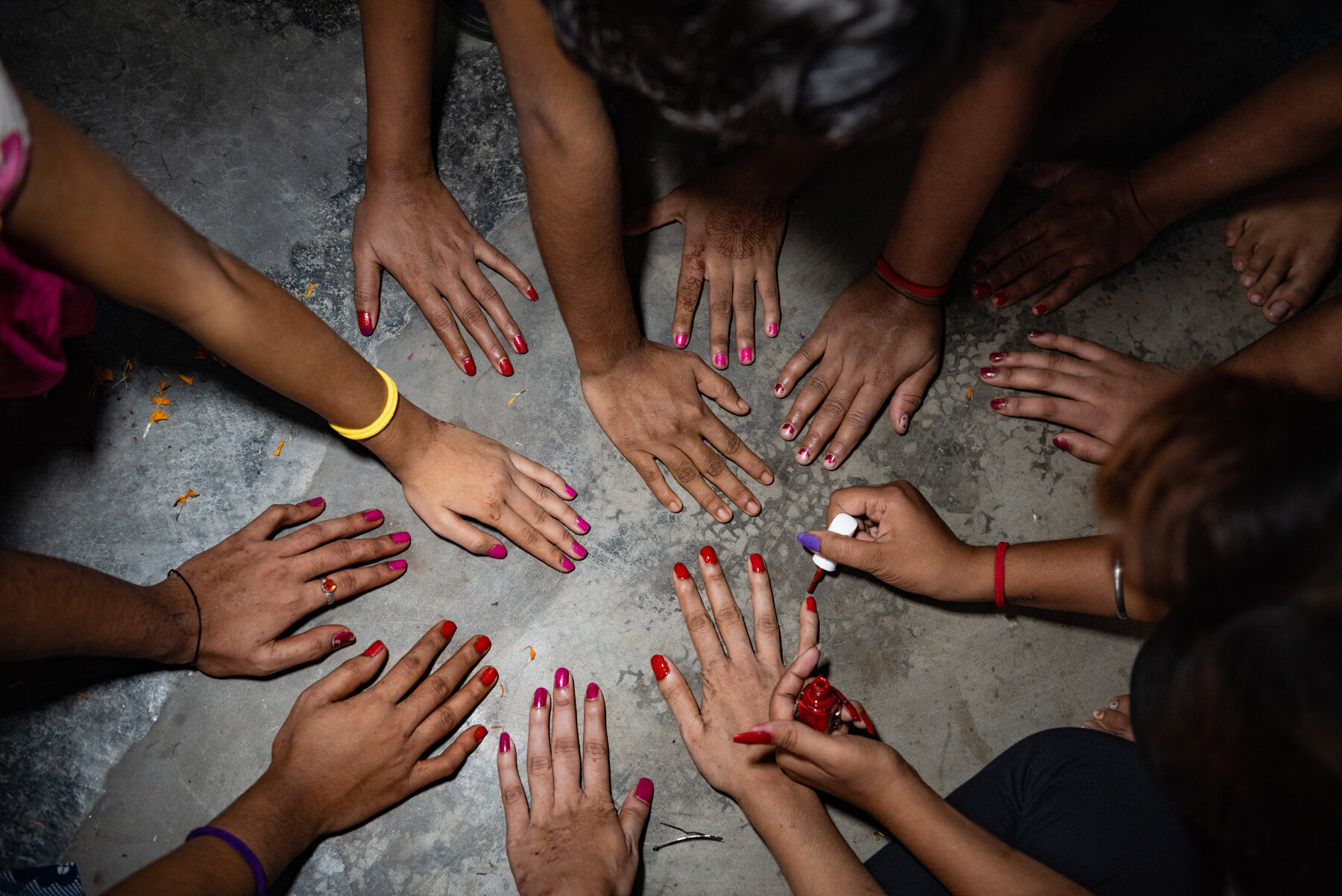
Girls paint their nails at a shelter in South 24 Parganas, West Bengal, India. Having shared similar traumatic experiences being trafficked and sold into sexual slavery, many of them forge strong relationships with one another as they prepare to return to their families and communities.

Sixteen-year-old M shows self-injury scars on her arm. M used to be beaten by heralcoholic father. In December 2017, she left her home in South 24 Parganas out of anger and took a train to Sealdah Station in Kolkata. At the station, she met three young men who befriended her and sold her to a brothel in the infamous Sonagachi red light district. The local police station was tipped off by an informer about an underage girl being held captive. The team went to the brothel and rescued her after three days. M currently lives at a shelter for trafficked girls near Kolkata and is experiencing depression and PTSD.

A pair of sandals that belonged to Sayeda. Along with Sayeda’s clothes and cosmetics, her mother has held on to a pair of sandals she loved to wear. They are heartbreaking reminders of her daughter’s spirited personality. At 14, Sayeda was trafficked from Khulna in Bangladesh to a brothel in Mahishadal, India by a boy she’d met at a dance school. For three years, Sayeda was held captive at the brothel. She was beaten and forced to have sex at all hours. In a police raid, Sayeda was rescued and sent to a shelter. She was preparing to return home to Bangladesh when she died from a liver problem caused by excessive drinking at the brothel.
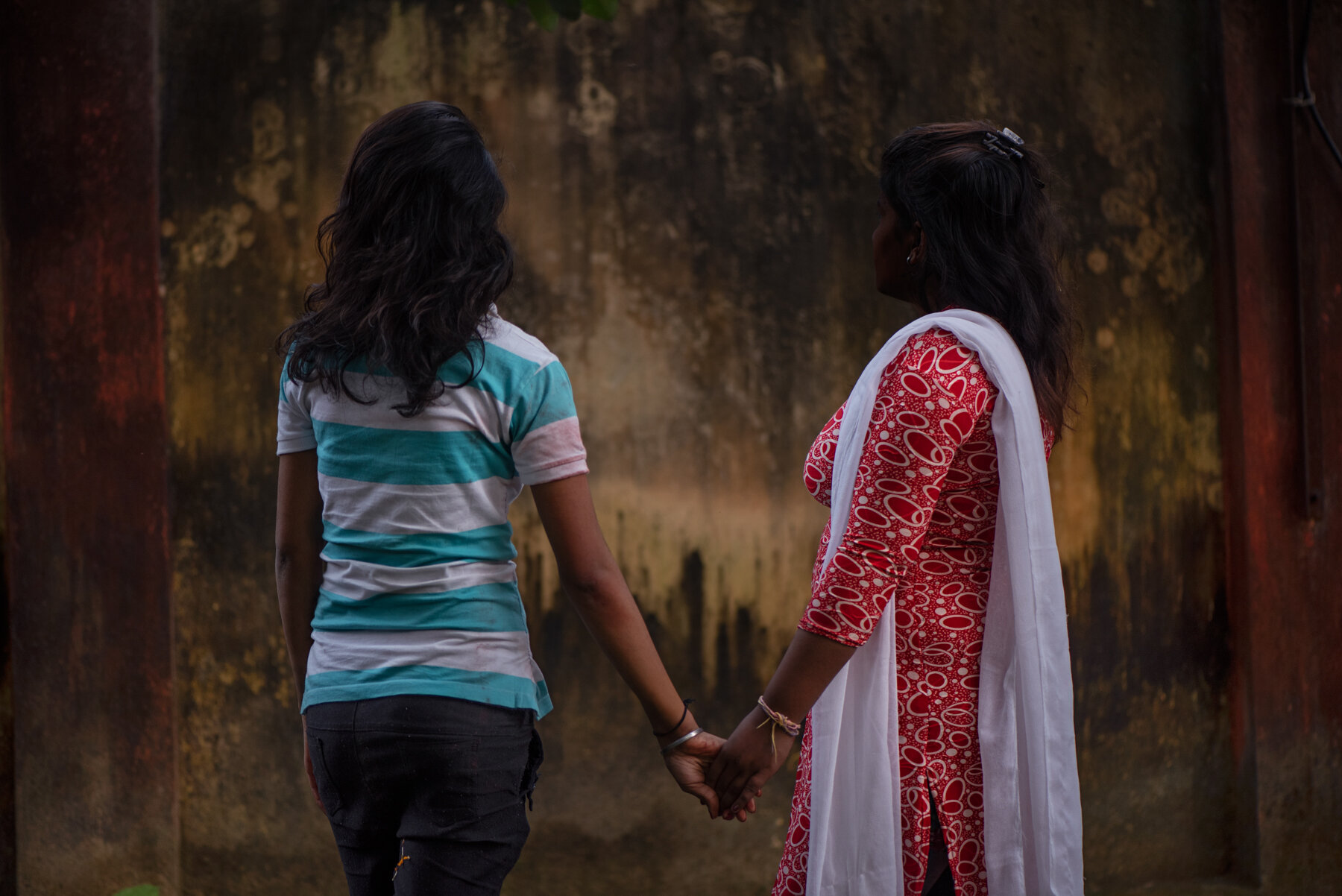
Sisters Z. and B. were trafficked by their aunt when they were in their early teens from Dhaka, Bangladesh to a brothel in Mahishadal, West Bengal. B. got pregnant at 15 and was forced to have an abortion. She often refused to have sex with customers; when she wouldn’t, the owner would make her sister whip her with a belt. “This was the most painful,” Z. said, worse than having to have sex with 20 clients a day.
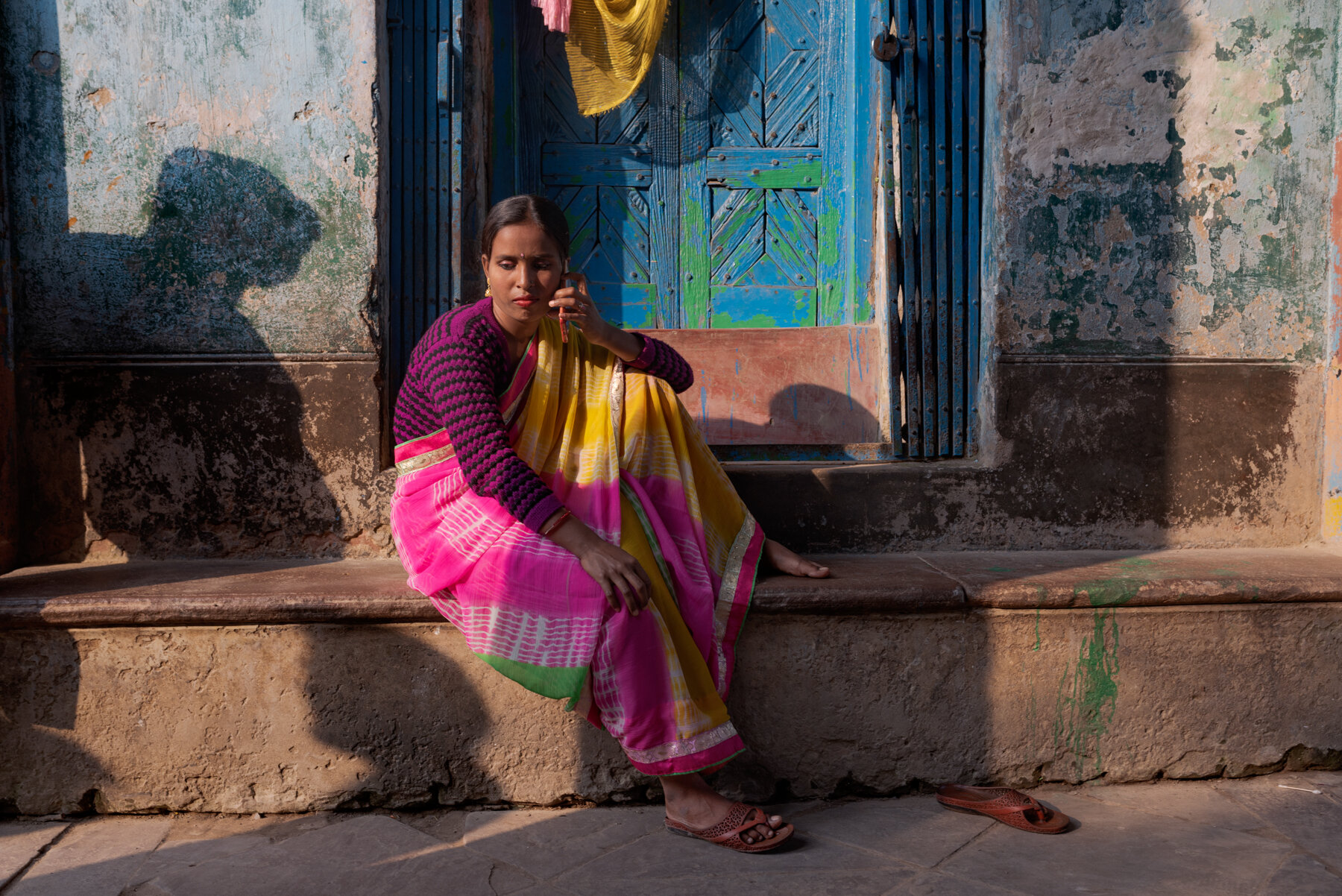
Shiuli, a 27-year-old sex worker, arranges to meet a client in the Kalighat red-light district of Kolkata, India. “A girl born to a poor family,” she said, “has to go through hell throughout her entire life.” Married at 13, Shiuli eventually left her abusive husband, taking their son with her, but her parents wouldn’t let her return home. She narrowly averted being trafficked. Unable to make enough as a maid, she became a sex worker. She has two other sons, fathered by clients.
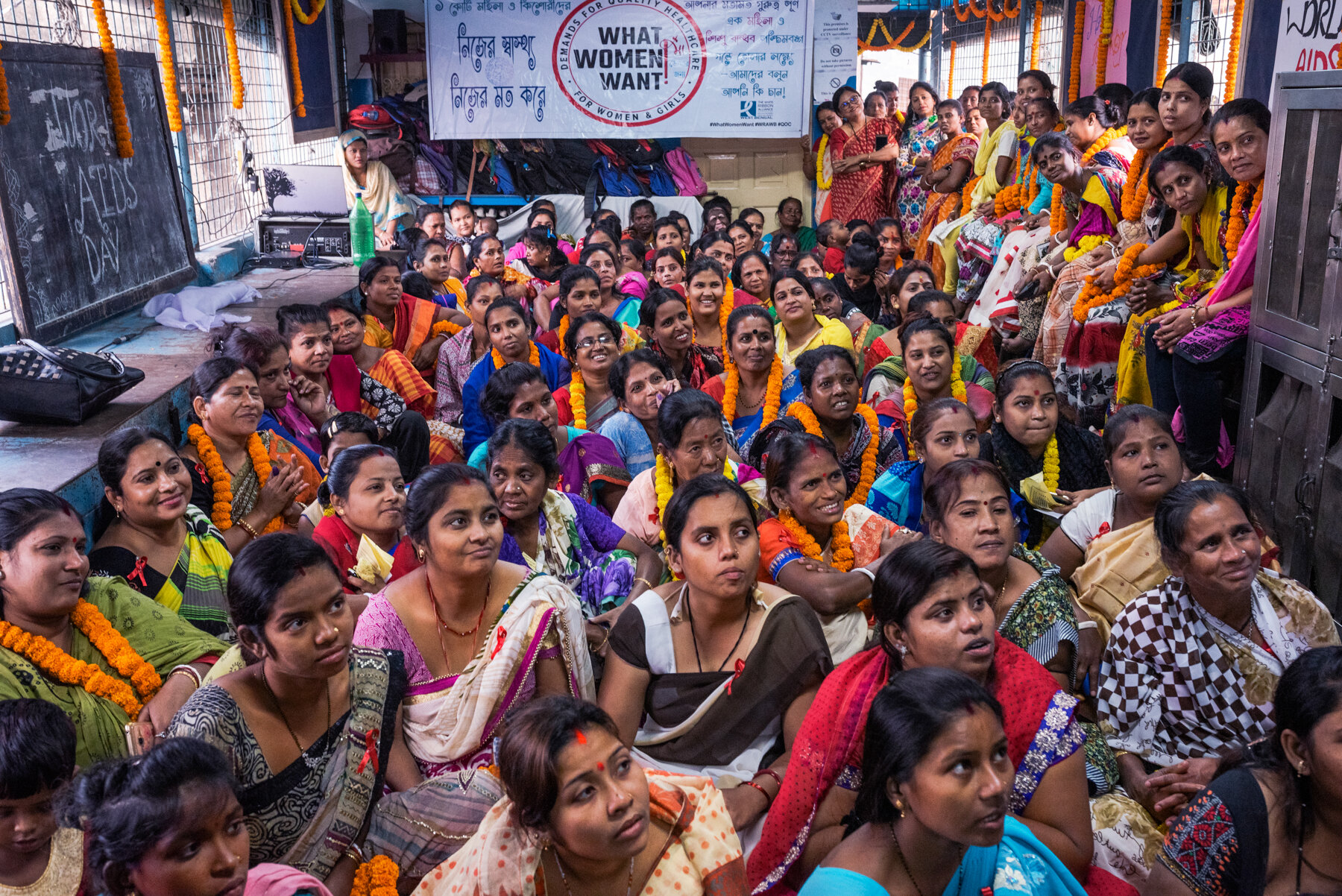
Sex workers and staff members attend the annual anniversary event of New Light on December 1, which coincides with World AIDS Day. New Light, a nonprofit based in the red light district of Kalighat in Kolkata, India offers care and schooling for the children of sex workers. It also collaborates with the union that represents them to prevent brothels in the area from forcing children into prostitution.

"I fell in love and trusted him. He said he loved me and wanted to marry me. How would I know that he would trick me and sell me for money". M., 18, fell in love with a man from her community and eloped with him from Gangasagar Island, near Kolkata. The man took her to Delhi and then sold her to a brothel. M. had to entertain around 15-20 clients everyday and would be severely beaten in the legs if she refused. She was rescued eight months later during a police raid and was reunited with her family in June 2017.
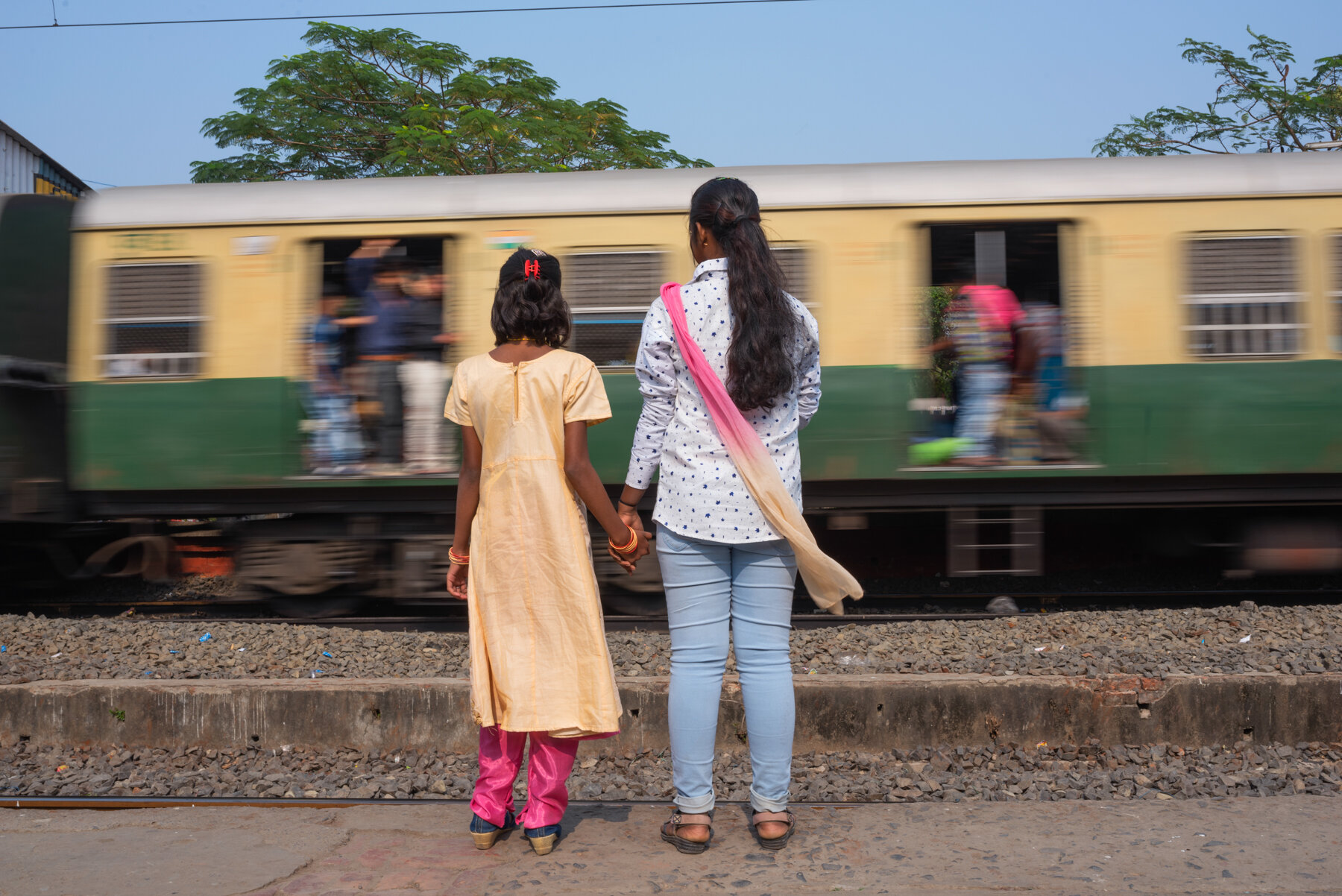
M., who is now 18, waits for a train with her cousin in South 24 Parganas, a largely poor district in West Bengal with a high incidence of trafficking. A man M. met in a class sold her to a brothel in Delhi. She managed to call her father and was rescued by police with help from a nonprofit called Shakti Vahini. “This incident is a dark episode in my life,” M. said. “When I came home, I was scared and ashamed. But I am not afraid anymore.”





















Rekha and Deepa study at a government run school in Torpa, Jharkhand. This region is extremely poor with social problems like domestic servitude trafficking, child marriage and witch hunting.Girls are sometimes tricked by traffickers while on their daily commute to school. These source traffickers are from the communities itself who introduce themselves as employees of placement agencies with the promise of a job and better life in the bigger cities of India.
Girls on their way back home from school at Torpa, Jharkhand, India. This tribal region of Jharkhand is affected by social problems like trafficking, child marriage and witch hunting. The government of Jharkhand has given bicycles to girls across the state to encourage them not to drop out of schools. Many girls in India are still missing out on education because of factors such as accessibility to school, quality of education and unsanitary conditions.
K was trafficked by a woman from her neighborhood and taken to Delhi where she was sold for $800 to a placement agency. The placement agency put her at a private residence to work as a maid, where she was not paid any salary and was often verbally abused. She was later rescued by the police and returned to her home in Jharkhand. K currently lives in a government hostel and is continuing with her studies.
A., who is now 19, eloped with a man several years ago. After she overheard him making plans to sell her to a brothel in Kolkata, she managed to escape. She was found at the railway station in Canning, West Bengal, India by representatives of Childline, an organization that helps children in distress. She was then taken to a shelter where she was counselled by mental health experts. A few months later she was reunited with her family.
Anjali was 16 when she became involved with a man who enticed her to run away from her home in Siliguri, a city in India’s West Bengal state, with the promise of marriage. Instead, he and an accomplice sold her to a brothel in Mahishadal, near Haldia, an industrial town in West Bengal. She was forced to have sex up to 20 times a day until she was rescued. For a year and a half, she lived at a shelter among girls she said understood her anguish. Now an adult, she’s living at home with her mother, who would like her to marry, but Anjali vows not to fall in love again. “I feel extremely lonely,” she said. “I miss my friends at the shelter.”
C.’s diary offers a glimpse into the teenager’s infatuation, which the man who trafficked her exploited. Her words in Bengali say: “If I don’t get you in my life, I will die. If I am not yours, I can’t be anyone else’s.”C., was trafficked as a teenager from South 24 Parganas, West Bengal, India. From passages in her diary, the family realized she’d eloped with a man she’d met. Months later, police found her in a brothel in Pune, a city in the western region of India. "I never thought I would be able to get out of that place," C. said. After going through the traumatic experience of sexual slavery, most girls find it difficult to adapt the life they once had. Girls during this transition period experience high rates of depression, anxiety, PTSD, self-harm, and even suicidal tendencies.
A West Bengal police boat patrols the Hooghly River in the Sundarbans, a watery area with dense mangrove forests that straddles the southern India-Bangladesh border. The Indian state of West Bengal shares a long border with Bangladesh which includes many unguarded stretches, allowing traffickers to smuggle girls into the country. Traffickers often use rivers to avoid detection when smuggling girls into India.
Railway Protection Force official, S.P. Kiro keeps vigilance at the Ranchi Railway Station. Close observation of the general body language of potential suspects through these video cameras has helped the police nab many traffickers who use this major railway junction to transfer girls from the rural areas to other larger cities of India.
Farak Ali Gayen, a trafficker at the Mathurapur Police Station in South 24 Parganas, West Bengal. Farrak was arrested in July 2017 based on a description a trafficking survivor Mala gave of a young man she said trafficked her. He stands between Jagdeep Singh Rawat, an anti-trafficking activist with Shakti Vahini, and police officer Shibendu Ghosh. Gayen promised to marry Mala, so she ran away from home. He said he was paid about $260 for every girl he brought to his sister in Delhi and that she sold the girls to various brothels. He said he and others on his team trafficked 11 girls from South 24 Parganas over a year and a half. In September 2022, Gayen was convicted to 7 years imprisonment by the Diamond Harbour Court.
Photographs of alleged traffickers, including both men and women, hang on a board at the Khunti Police Station in Jharkhand. Most girls are trafficked by people known to them, sometimes it is the victim’s own relative or neighbor.
Rescued girls at the Sneha shelter in South 24 Parganas, West Bengal, India. The shelter cares for some 80 to 90 girls and women who were victims of abuse or who are considered to be at risk. Besides girls who were trafficked to brothels, there are others who were forced into marriages as minors or who were victims of domestic violence. Sneha—which means "affection" in Bengali—provides medical care, counseling, and training in skills such as tailoring that might help them rebuild their lives.
When girls arrive at the shelter, they receive a welcome kit that includes a handmade towel called 'gamcha' , a dress, underclothes, and other personal items. It’s a way to make them feel cared for, a small step toward restoring the respect and dignity that have been robbed from them.
Girls paint their nails at a shelter in South 24 Parganas, West Bengal, India. Having shared similar traumatic experiences being trafficked and sold into sexual slavery, many of them forge strong relationships with one another as they prepare to return to their families and communities.
Sixteen-year-old M shows self-injury scars on her arm. M used to be beaten by heralcoholic father. In December 2017, she left her home in South 24 Parganas out of anger and took a train to Sealdah Station in Kolkata. At the station, she met three young men who befriended her and sold her to a brothel in the infamous Sonagachi red light district. The local police station was tipped off by an informer about an underage girl being held captive. The team went to the brothel and rescued her after three days. M currently lives at a shelter for trafficked girls near Kolkata and is experiencing depression and PTSD.
A pair of sandals that belonged to Sayeda. Along with Sayeda’s clothes and cosmetics, her mother has held on to a pair of sandals she loved to wear. They are heartbreaking reminders of her daughter’s spirited personality. At 14, Sayeda was trafficked from Khulna in Bangladesh to a brothel in Mahishadal, India by a boy she’d met at a dance school. For three years, Sayeda was held captive at the brothel. She was beaten and forced to have sex at all hours. In a police raid, Sayeda was rescued and sent to a shelter. She was preparing to return home to Bangladesh when she died from a liver problem caused by excessive drinking at the brothel.
Sisters Z. and B. were trafficked by their aunt when they were in their early teens from Dhaka, Bangladesh to a brothel in Mahishadal, West Bengal. B. got pregnant at 15 and was forced to have an abortion. She often refused to have sex with customers; when she wouldn’t, the owner would make her sister whip her with a belt. “This was the most painful,” Z. said, worse than having to have sex with 20 clients a day.
Shiuli, a 27-year-old sex worker, arranges to meet a client in the Kalighat red-light district of Kolkata, India. “A girl born to a poor family,” she said, “has to go through hell throughout her entire life.” Married at 13, Shiuli eventually left her abusive husband, taking their son with her, but her parents wouldn’t let her return home. She narrowly averted being trafficked. Unable to make enough as a maid, she became a sex worker. She has two other sons, fathered by clients.
Sex workers and staff members attend the annual anniversary event of New Light on December 1, which coincides with World AIDS Day. New Light, a nonprofit based in the red light district of Kalighat in Kolkata, India offers care and schooling for the children of sex workers. It also collaborates with the union that represents them to prevent brothels in the area from forcing children into prostitution.
"I fell in love and trusted him. He said he loved me and wanted to marry me. How would I know that he would trick me and sell me for money". M., 18, fell in love with a man from her community and eloped with him from Gangasagar Island, near Kolkata. The man took her to Delhi and then sold her to a brothel. M. had to entertain around 15-20 clients everyday and would be severely beaten in the legs if she refused. She was rescued eight months later during a police raid and was reunited with her family in June 2017.
M., who is now 18, waits for a train with her cousin in South 24 Parganas, a largely poor district in West Bengal with a high incidence of trafficking. A man M. met in a class sold her to a brothel in Delhi. She managed to call her father and was rescued by police with help from a nonprofit called Shakti Vahini. “This incident is a dark episode in my life,” M. said. “When I came home, I was scared and ashamed. But I am not afraid anymore.”